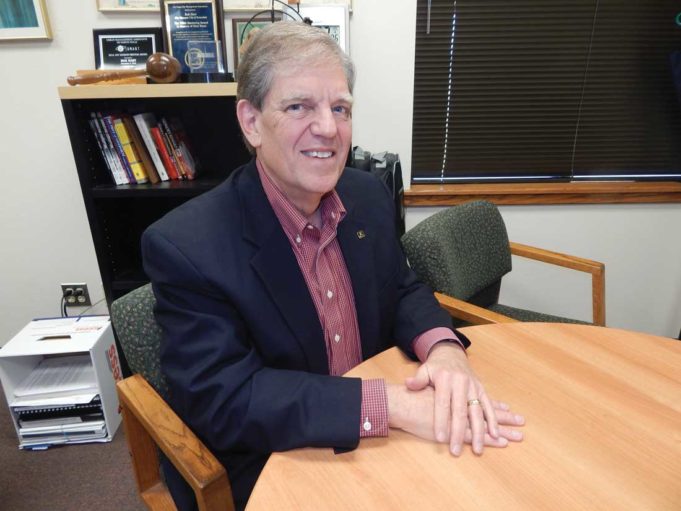North Texas has suffered its share of draught in recent years, and municipal water utilities in the region have been desperately trying to bring water usage under control. The city leading that charge is Kennedale, which has adopted a policy of smart water meters and combined it with cutting-edge computer technology. Now, Kennedale can see not only how much water every home and business in the city is using but also when they’re using it. The result of that innovative approach has been a considerable drop in water usage by residents, while at the same time increasing revenue to the water district without increasing the cost of water to homes.
“Like everyone here in North Texas, we’ve had water shortages,” said Bob Hart, Kennedale’s city manager. “And we’d have to tell people to conserve, cut back on water use. Now the problem with that is that when people conserve water, the amount of funding coming into the water utility drops, and that affects Kennedale’s ability to pay the bills associated with providing water to our residents and businesses.”
While most people don’t spend much time thinking about what goes into getting people water, the truth is that there is quite a lot involved, such as putting new meters and lines out to new homes, repairing water pipes, checking water wells, taking water samples, maintaining hydrants, and a host of other things we wouldn’t ordinarily notice. So a water utility’s financial shortfall can actually have quite a large ripple effect — the worst case recently being the disastrous decisions made in Flint, Mich., where an effort by city fathers there to save money wound up exposing thousands of people to lead poisoning, which resulted in at least 10 deaths.
“About four or five years ago, we realized we had to do something to both control our water usage and find more revenue,” Hart said. “Before we did anything, we went out and talked to people from other towns to see what they were doing. And that resulted in us replacing all of the water meters in Kennedale with new ‘smart water meters’ that send accurate water use data to a computer system. We were no longer dependent on meter readers going out into the field to read each meter or old meters that didn’t read usage properly. That was the first step.”
But Hart quickly found that using smart meters wasn’t enough.
“You still only got a reading once a month, and that just wasn’t providing enough data for us,” he said. “So I looked around to see what technology was out there that might provide more information, read the meters, and put it into your billing system. It turned out you could buy that technology, but it was very expensive. A city like Fort Worth might be big enough to buy a system like that and control it, but with me sitting here with 3,000 meters, it simply wasn’t financially possible. So I began looking for someone with the technology we needed with whom we could contract.”
And that’s when Kennedale “stumbled into” Fathom Water Management. The Phoenix, Ariz., company had the technology that would allow Kennedale to read water meters every 15 minutes.
Hart said that while no one is interested in reading an individual’s water usage every 15 minutes, it’s a vital tool in identifying problems.
“People call all the time, upset with their water bill,” he said. “Now in the past, with the old meters, there wasn’t much we could tell them. But now we’ll monitor their usage — and they can monitor their own usage daily — and see where they’re using a lot of water.”
The main culprit is generally lawn watering.
Hart and company once realized that one complainant was watering his lawn four times a week all year round.
“He had no idea, because it was an automatic sprinkler system, and he wasn’t home when it was on,” Hart said. “He had no idea who had even programmed it or how to reprogram it.
“Then we had a woman with a brand new house and a brand new lawn,” he continued, “and it turned out that whoever programmed her sprinkler system had set it to water six times a week. Well, of course her bill was high!”
Hart, who has been Kennedale’s city manager for 10 years after stints as city manager in Huntsville, Sweetwater, and elsewhere, laughed when he told the story.
“Twice a week,” he said, “even in dry times, is plenty of lawn watering, and then it should be shut down altogether during the cold months.”
But it’s not only the big things the Fathom technology can catch. If someone’s bill is going up and staying up, Hart and his team will look at the bill and might notice that water is bring used day and night, which might indicate a leaky toilet or sink. And while the cost of a leak might not be much for a single night, over a month even a small leak can add up to be noticeable on a water bill.
The technology will even alert the computer if there is a spike in water usage: “If that happens, we’ll call the customer and tell them they might want to look for a major leak somewhere.”
Jason Bethke, Fathom’s president, said that when Kennedale got in touch, he “knew they needed to do more than water conservation because they were facing declining revenue. So the technology we provided not only gave them more data that could enhance their conservation efforts, it also increased revenue by making certain that all billing was going out correctly because they now had the tech to track water usage in a very exacting manner.”
Bethke said his technologies’ real value is that it makes people more aware of their patterns of water usage, “which drives behavior changes to increase people’s conservation. When people see that they can lower their water bill considerably by cutting one night of lawn watering per week, that gives people an incentive to change.”
Of course, despite awareness, Hart said, it is finally up to the home or business owner to make the changes in their water use patterns.
“This won’t force them to do anything,” he said, “but when they realize the money they’re throwing away, well, let’s say it encourages conservation.”
For Kennedale, the initial costs were not cheap. The city paid $1.7 million for the 3,000 smart meters, and it pays about $5 per month per meter to Fathom.
“That’s a considerable investment,” Hart said, “but we recoup that by getting more accurate readings on the new meters, which produces more accurate billings, and that drives more revenue. It’s only been a few years, and we’re already close to breaking even.”
It’s not about making the city money, however, he added.
“What it’s really about is how are we all going to have enough water as the population of North Texas grows and water gets more scarce? We don’t really have any other options but to conserve. So we look at this as a long-term project, getting people to change their water use patterns one at a time. And though it’s still early on in this project, the numbers are definitely trending in the right direction. Our water use is down. Our revenues are up. That’s what we were hoping to see, and we’re seeing it.”












